This is a list of books and essays about Sam Peckinpah. An American film director and screenwriter.
This is a list of books and essays about Sam Peckinpah. An American film director and screenwriter.
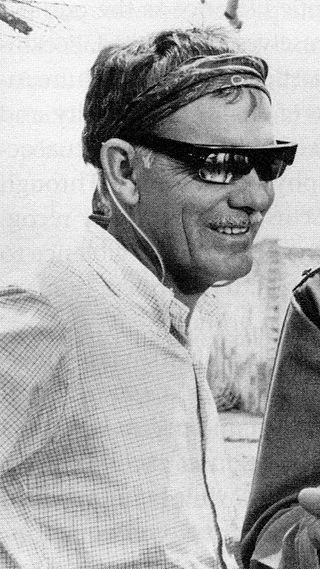
David Samuel Peckinpah was an American film director and screenwriter. His 1969 Western epic The Wild Bunch received an Academy Award nomination and was ranked No. 80 on the American Film Institute's top 100 list. His films employed a visually innovative and explicit depiction of action and violence as well as a revisionist approach to the Western genre.
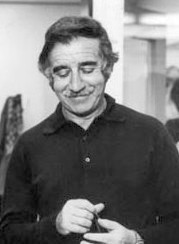
Donald Siegel was an American film and television director and producer.

Ride the High Country is a 1962 American CinemaScope Western film directed by Sam Peckinpah and starring Randolph Scott, Joel McCrea, and Mariette Hartley. The supporting cast includes Edgar Buchanan, James Drury, Warren Oates, and Ron Starr. The film's script, though credited solely to veteran TV screenwriter N. B. Stone Jr., was – according to producer Richard E. Lyons – almost entirely the work of Stone's friend and colleague, William S. Roberts, and Peckinpah himself.
The Wild Bunch is a 1969 American epic Revisionist Western film directed by Sam Peckinpah and starring William Holden, Ernest Borgnine, Robert Ryan, Edmond O'Brien, Ben Johnson and Warren Oates. The plot concerns an aging outlaw gang on the Mexico–United States border trying to adapt to the changing modern world of 1913. The film was controversial because of its graphic violence and its portrayal of crude men attempting to survive by any available means.

Straw Dogs is a 1971 psychological thriller film directed by Sam Peckinpah and starring Dustin Hoffman and Susan George. The screenplay, by Peckinpah and David Zelag Goodman, is based upon Gordon M. Williams's 1969 novel, The Siege of Trencher's Farm. The film's title derives from a discussion in the Tao Te Ching that likens people to the ancient Chinese ceremonial straw dog, being of ceremonial worth, but afterwards discarded with indifference.

The Getaway is a 1972 American heist thriller film based on the 1958 novel by Jim Thompson. The film was directed by Sam Peckinpah, written by Walter Hill, and stars Steve McQueen, Ali MacGraw, Ben Johnson, Al Lettieri, and Sally Struthers. The plot follows imprisoned mastermind robber Carter "Doc" McCoy (McQueen), whose wife Carol (MacGraw) conspires for his release on the condition they rob a bank in Texas. A double-cross follows the crime and the McCoys are forced to flee for Mexico with the police and criminals in hot pursuit.

Pat Garrett & Billy the Kid is the twelfth studio album and first soundtrack album by American singer-songwriter Bob Dylan, released on July 13, 1973, by Columbia Records for the Sam Peckinpah film of the same name. Dylan himself appeared in the film as the character "Alias". The soundtrack consists mainly of instrumental music and was inspired by the movie itself. The album includes "Knockin' on Heaven's Door", which became a trans-Atlantic Top 20 hit.
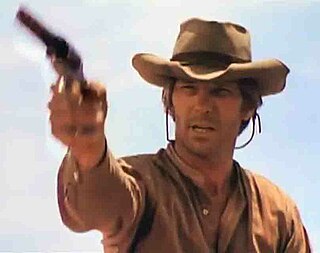
Justus Ellis McQueen Jr., known professionally as L. Q. Jones, was an American actor and director. He appeared in Sam Peckinpah's films Ride the High Country (1962), Major Dundee (1965), The Wild Bunch (1969), The Ballad of Cable Hogue (1970), and Pat Garrett and Billy the Kid (1973). His later film roles include Casino (1995), The Patriot, The Mask of Zorro (1998), and A Prairie Home Companion (2006).
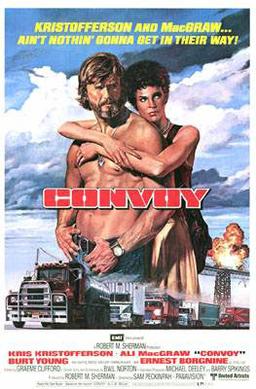
Convoy is a 1978 American road action comedy film directed by Sam Peckinpah and starring Kris Kristofferson, Ali MacGraw, Ernest Borgnine, Burt Young, Madge Sinclair and Franklyn Ajaye. The film is based on the 1975 country and western novelty song "Convoy" by C. W. McCall. The film was made when the CB radio/trucking craze was at its peak in the United States, and followed the similarly themed films White Line Fever (1975) and Smokey and the Bandit (1977). The film received mixed reviews from critics; however, it was the most commercially successful film of Peckinpah's career.

Junior Bonner is a 1972 American Western film directed by Sam Peckinpah and starring Steve McQueen, Robert Preston, Joe Don Baker and Ida Lupino. The film focuses on a veteran rodeo rider as he returns to his hometown of Prescott, Arizona, to participate in an annual rodeo competition and reunite with his brother and estranged parents. Many critics consider it to be the warmest and most gentle of Peckinpah's films.
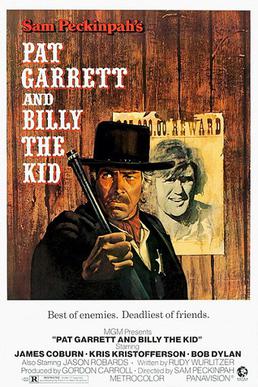
Pat Garrett and Billy the Kid is a 1973 American revisionist Western film directed by Sam Peckinpah, written by Rudy Wurlitzer, and starring James Coburn, Kris Kristofferson, Richard Jaeckel, Katy Jurado, Chill Wills, Barry Sullivan, Jason Robards, Slim Pickens and Bob Dylan. The film is about an aging Pat Garrett (Coburn), hired as a lawman by a group of wealthy New Mexico cattle barons to bring down his old friend Billy the Kid (Kristofferson).

Major Dundee is a 1965 American Western film directed by Sam Peckinpah and starring Charlton Heston, Richard Harris, Jim Hutton, and James Coburn. Written by Harry Julian Fink, the film is about a Union cavalry officer who leads a contentious troop of Army regulars, Confederate prisoners, and Indian scouts on an expedition into Mexico during the American Civil War to destroy a band of Apaches who have been raiding United States bases and settlements in the New Mexico territory. Major Dundee was filmed in various locations in Mexico. The movie was filmed in Eastman Color by Pathécolor, print by Technicolor.
"Sam Peckinpah's 'Salad Days'" is a sketch from the 7th episode of the third series of the British television programme Monty Python's Flying Circus.
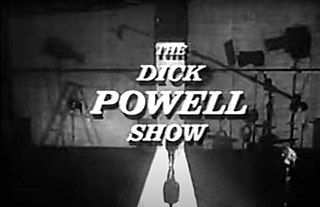
The Dick Powell Show is an American television anthology series that ran on NBC from September 26, 1961, until September 17, 1963, primarily sponsored by the Reynolds Metals Company.
The Deadly Companions is a 1961 American Western and war film directed by Sam Peckinpah and starring Maureen O'Hara, Brian Keith, Steve Cochran, and Chill Wills. Based on the novel of the same name by A. S. Fleischman, the film is about an ex-army soldier who accidentally kills a woman's son, and tries to make up for it by escorting the funeral procession through dangerous Indian territory. The Deadly Companions was Sam Peckinpah's motion picture directorial debut.

Robert Golden Armstrong Jr. was an American character actor and playwright. A veteran performer who appeared in dozens of Westerns during his 40-year career, he may be best remembered for his work with director Sam Peckinpah.

Django is a fictional character who appears in a number of Spaghetti Western films. Originally played by Franco Nero in the Italian film of the same name by Sergio Corbucci, he has appeared in 31 films since then. Especially outside of the genre's home country Italy, mainly Germany, countless releases have been retitled in the wake of the original film's enormous success.
Lou Lombardo was an American filmmaker whose editing of the 1969 film The Wild Bunch has been called "seminal". In all, Lombardo is credited on more than twenty-five feature films. Noted mainly for his work as a film and television editor, he also worked as a cameraman, director, and producer. In his obituary, Stephen Prince wrote, "Lou Lombardo's seminal contribution to the history of editing is his work on The Wild Bunch (1969), directed by Sam Peckinpah. The complex montages of violence that Lombardo created for that film influenced generations of filmmakers and established the modern cinematic textbook for editing violent gun battles." Several critics have remarked on the "strange, elastic quality" of time in the film, and have discerned the film's influence in the work of directors John Woo, Quentin Tarantino, Kathryn Bigelow, and the Wachowskis, among others. While Lombardo's collaboration with Peckinpah lasted just a few years, his career was intertwined with that of director Robert Altman for more than thirty years. Lombardo edited Altman's 1971 film McCabe & Mrs. Miller (1971), which had "a radical approach to the use of dialogue and indeed other sound, both in and beyond the frame." Towards the end of his career Lombardo edited Moonstruck (1987) and two other films directed by Norman Jewison. While his editing is now considered "revolutionary" and "brilliant", Lombardo was never nominated for editing awards during his career.
Stephen Robert Prince was an American film critic, historian and theorist. He was a Professor of Communication Studies and was a Professor of Cinema at Virginia Polytechnic Institute and State University. His books include The Warrior's Camera: The Cinema of Akira Kurosawa (1991) and Savage Cinema: Sam Peckinpah and the Rise of Ultraviolent Movies (1998).Prince was frequently cited as an expert in East Asian cinema by Criterion and can often be heard in commentary tracks in their collections.

The legend of Billy the Kid has acquired iconic status in American folklore, yet the outlaw himself, also known as William Bonney, had minimal impact on historical events in New Mexico Territory of the late 1800s. More has been written about Billy the Kid than any other gunslinger in the history of the American West, while hundreds of books, motion pictures, radio and television programs and even a ballet have been inspired by his legend.